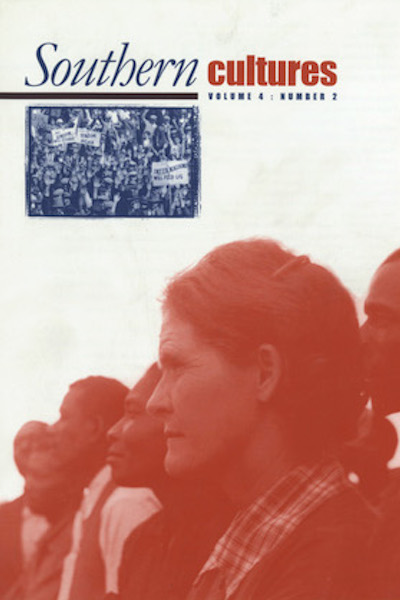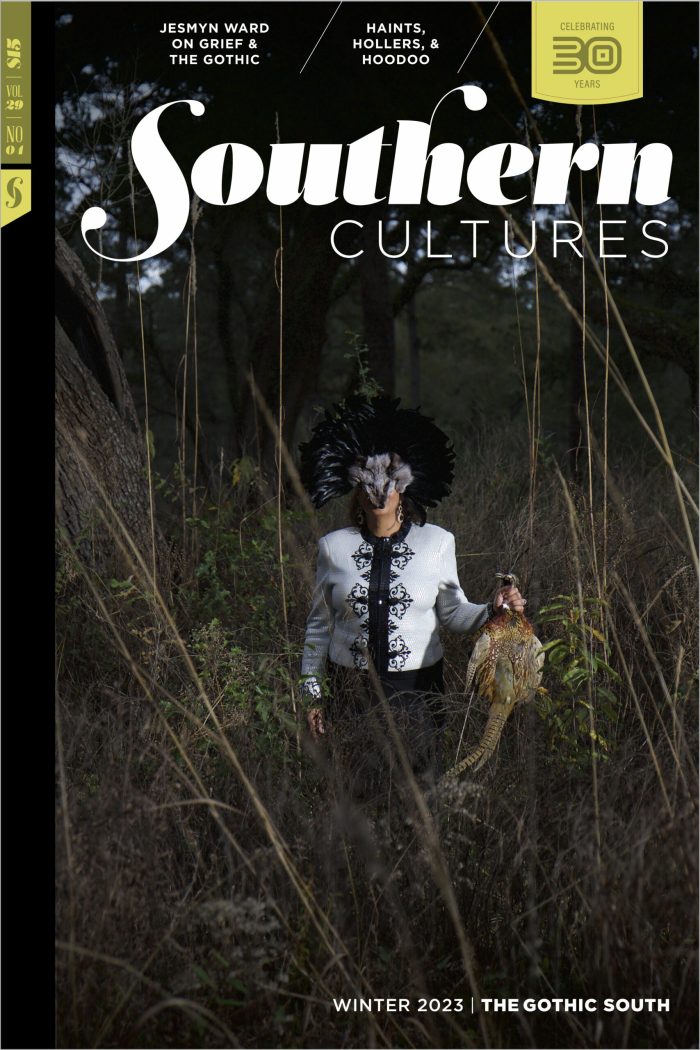by Harry L. Watson
Myrtle Lawrence and the Southern Tenant Farmers' Union
by Elizabeth Anne Payne,
Louise Boyle
by Celeste Ray
by Robert M. S. McDonald
By August 1802, the image of Thomas Jefferson had not yet been carved in stone, but it had at least been molded in wax. The likeness of the third president stood alongside twenty-four other famous figures on display in Georgetown. Adults handed over fifty cents to view the traveling exhibit; children paid half-price. Had this »
by Michael Chitwood
In “The Great Wagon Road,” published in the Spring 1997 issue of Southern Cultures, historian T.H. Breen told of his encounters and adventures while attempting to trace the route of the great migration of German and Scots–Irish settlers from lands north into the Carolinas. Breen’s essay set Michael Chitwood thinking…
by Margaret D. Bauer
University of Georgia Press, 1996 In her preface to this collection of her 1995 Lamar Memorial Lectures, Harris explains that, upon first being invited to give the lectures, she knew immediately that she wanted to speak on the “orality” of Zora Neale Hurston’s work. Her selection of Hurston’s Mules and Men points to the value »
by Peter H. Wood
University of Georgia Press, 1997 In 1847 while debate over the controversial War with Mexico raged in Congress, the decoration of Charles Bulfinch’s U.S. Capitol Building was nearing completion. John Trumbull’s four epic scenes of the revolutionary era had graced one side of the massive Rotunda for several decades, and three paintings featuring Columbus, Pocahontas, »
by Robert M. Weir
Louisiana State University Press, 1996 J. Russell Snapp’s volume joins a rapidly lengthening list of new studies of the southern frontier in the eighteenth century—all intent on enlarging our understanding of Native Americans, Indian-white relations, and/or the American Revolution in the region. Insofar as it shares these aims, Snapp’s volume is not unique, but to »
by Jane Turner Censer
University of Georgia Press, 1996 In her introduction to Tokens of Affection, Carol Bleser alludes to the spell that Maria Bryan’s letters cast over John Shaw Billings II, managing editor of Time magazine and Henry Luce’s second in command. In the 1950s Billings would sometimes hurry home from meetings just to spend the evening perusing »
by Michael Lienesch
University of North Carolina Press, 1995 As southern cultures go, we may know least about the largest: the millions of rural white people, many of them poor, whom Frank Owsley called “plain folk.” Historically they have been an elusive population: celebrated by Jeffersonians as sturdy and virtuous yeomen, denigrated by conservative elites as “crackers” or »
by Peter A. Coclanis
University of Georgia Press, 1995 In writing this review, I promised myself I would not start by alluding to a collection of essays on the South written almost seventy years ago by a dozen intellectuals associated with Vanderbilt University. Just because the new collection, The South as an American Problem, is the work of a »
by Bryant Simon
Alfred A. Knopf, 1995. University Press of Virginia, 1995. Last year, I assigned Erskine Caldwell’s Tobacco Road to my upper-level twentieth-century U.S. history class. On the first day of the quarter, as the students scanned the syllabus, one of them asked, “Who is this Erskine Caldwell guy?” I answered with a question, “Have any of »
by William McCranor Henderson
Westview Press, 1997 In 1995 the highly publicized First International Conference on Elvis Presley sent a clear message: Elvis was entering the academy with all the eclectic fanfare that had made him King of Rock ‘n’ Roll. Though controversial, academic status for Elvis seemed appropriate, since his presence had long been felt everywhere else. But »
by James C. Wann
University of North Carolina Press, 1995 Some dozen years in the making, this thoroughly researched (800 films) yet highly readable treatise draws on J. W. Williamson’s long-time fascination with hillbilliana, and on the long-running “Hollywood Appalachia” class he teaches at Appalachian State University in Boone, North Carolina. He knows his subject.
by Michael Taft
The University of Tennessee Press, 1996 Jon Michael Spencer’s latest book may be taken as an extended introductory essay to his theory of theomusicology. His title invites us to “re-search” the subject and nature of black music; that is, Spencer asks his readers to begin again their consideration of African American musical traditions from a »
by Carl Tobias
University of Alabama Press, 1997 Alexander Leidholdt’s Standing Before the Shouting Mob is primarily a biographical account of Lenoir Chambers, the editorial page editor of the Norfolk Virginian-Pilot. The book emphasizes the role that Chambers and the newspaper played in shaping public opinion during the half-decade period when Virginia practiced “massive resistance” to the desegregation of public schools. The »
by James L. Peacock
The University of Alabama Press, 1996 As though following a kind of Gresham’s law in the religious realm, fundamentalisms of various kinds have surged throughout the world at the expense of moderate or liberal perspectives. This is obviously true for Islam, reportedly true for Judaism, and apparently also for Christianity. In fact, the trend is »
by Bruce Southard
University of North Carolina Press, 1997 Separated from the mainland by some twenty miles, Ocracoke Island is the site of one of the oldest villages in the inhabited islands of North Carolina’s Outer Banks. Founded in 1715, when the North Carolina Assembly passed a bill providing for settling and maintaing pilots at Ocracoke Inlet, an »
by John Shelton Reed
Lisa Howorth has observed that southerners can be distinguished by what goes into their mouths and what comes out of them. Many of the questions on the twice-yearly Southern Focus Poll deal with one or another of these aspects of the South. In the spring of 1995, 907 residents of the southern states and 506 »
by Fred R. Reenstjerna
Because Germans have been in the South for over 250 years, they have blended more completely into southern culture than, say, Germans in Pittsburgh or Detroit. While a great deal has been made about Celtic and English influences in southern culture, less attention has been paid to other significant European influences. Most especially, German culinary »
by Patrick Huber
Although songs of social protest had deep roots in the American South, the Gastonia strike marked one of the first labor conflicts in the region that produced a large repertoire of protest songs written specifically for the occasion. On 25 August 1929 Margaret Larkin attended an outdoor strike rally near Mount Holly, a textile-mill town »
by Lauren F. Winner
My students last summer had never heard of Jim Crow. U.S. Government is not an area in which I can claim expertise, but when I applied for a summer job with Duke University’s Talent Identification Program—a camp for academically gifted middle- and high-school students—someone in hiring thought my few years’ study of American history and »





